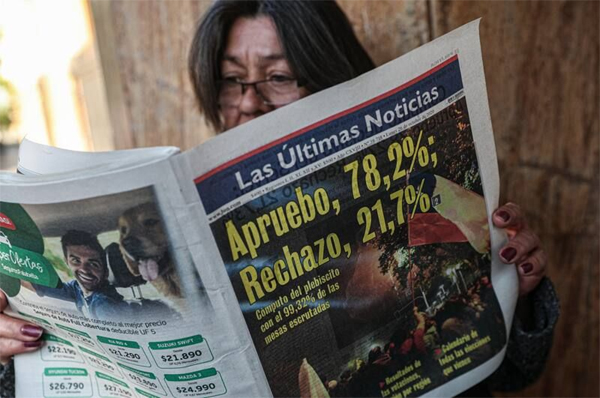
Yesterday, Chilean voters overwhelmingly rejected the constitutional rewrite drafted by the country’s citizen-elected constitutional assembly. With 86% voter turnout, 62% voted to reject, compared to just 38% voting to approve. In 2020, 78% of voters had voted in favor of writing a new magna carta, albeit with 51% turnout. As a result of yesterday’s vote, the current, Pinochet-era constitution will remain in place. (Detailed statistics from the election are available at DecideChile)
The proposed text was widely viewed as among the most progressive constitutions in the world, with The New York Times noting that it “would have legalized abortion, mandated universal health care, required gender parity in government, given Indigenous groups greater autonomy, empowered labor unions, strengthened regulations on mining and granted rights to nature and animals.” Detractors, however, viewed the 388-article document as radical and utopian. According to The Washington Post, one key aspect of the proposed constitution rejected by voters was that it would have made the country a plurinational state, with “many of the concerns centered on a core issue of national identity.” Nearly 13% of Chile identifies as Indigenous.
But this is likely not the end of the story for Chile’s constitution. According to El País, recent polling shows that Chilean voters are still overwhelmingly in favor of change: just 17% of polling respondents favored rejecting the proposed rewrite and continuing with the current constitution, whereas 35% supported rejecting the proposed constitution but starting a new rewrite process. Furthermore, Reuters reports, ““Center-left and right wing parties that promoted the reject campaign have also agreed to negotiate to prepare a new text.” Last night, President Gabriel Boric accepted the plebiscite’s results “with humility” and said that “Chilean democracy comes out more robust,” calling for dialogue and the development of a new constitutional proposal that would better unite the country, says The Washington Post.
(DecideChile, The Washington Post, Reuters, The Guardian, The New York Times, El País)
More Chile
- “A former Chilean police special forces captain has been found guilty of assault after permanently blinding a woman he shot in the face with a teargas canister during a wave of protests in 2019,” reports The Guardian.

Argentina
- “Legionella has been confirmed as the cause of a cluster of pneumonia cases associated with a health clinic in the province of Tucuman, Argentina,” reports the Pan American Health Organization (PAHO).
Bolivia
- Cocaine production in Bolivia is fueled by cheap coca cultivation in Peru, reports InSight Crime.
Brazil
- The number of guns registered by Hunters, Shooters, and Collectors clubs (CACs) has nearly tripled over the last three years, reaching 1 million. (Globo)
- In the Amazon, “Activists like Lira suspect that the prospect of Jair Bolsonaro’s defeat in October’s presidential election has sparked a last-minute race to raze the jungle, with an unholy trinity of illegal loggers, cattle ranchers and gold miners intensifying their activities before his successor takes office,” says The Guardian.
Colombia
- “Colombia will give properties confiscated from drug trafficking groups… to farmers, women’s organizations, youth collectives and universities,” reports Reuters.
- “Colombia could require mining firms get environmental licenses for exploration in order to protect the environment, increase state control and prevent conflict between communities and extractive companies, the environment minister said on Thursday,” reports Reuters.
El Salvador
- El Faro writes that El Salvador’s state of exception has resulted in wrongful arrests and abuse of prisoners: “La Prensa Gráfica (LPG) reported on August 10 that Medicina Legal, the coroner’s office, found signs of torture and murder in at least 35 of 69 registered deaths.”
Guatemala
- Deported Guatemalans are “(returning) to find their living conditions worse than when they left,” writes Jeff Abbott in Foreign Policy.
Honduras
- Afro-Honduran Garifunas are protesting for state protection and for President Xiomara Castro to fulfill her campaign promises in support of Garifunas and other Indigenous and Afro-descendant communities,” says Al Jazeera.
Mexico
- The Mexican Chamber of Deputies has approved AMLO’s proposal to place the National Guard under the Ministry of Defense, according to Reforma. WOLA’s Stephanie Brewer’s recent commentary explores Mexico’s militarized security strategy, arguing that it has failed. (see 8/31/22 LADB)
- “Mexican housing must become denser and better planned to provide adequate living options to lower-income parts of the population, according to a new study, which said the country’s current residential construction was largely unregulated,” reports Reuters.
Regional
- Catherine Osborn at the Foreign Policy Latin America Brief explores the history of reggaeton, a mix of Spanish-language rapping and Jamaican dembow beats that has risen to popularity outside of just Latin America and the Caribbean in recent years.
- InSight Crime explains the history of the global cocaine trade, based on “the subtropical Latin American shrub Erythroxylum.”
Arianna Kohan y Jordi Amaral / Latin America Daily Briefing
http://latinamericadailybriefing.blogspot











